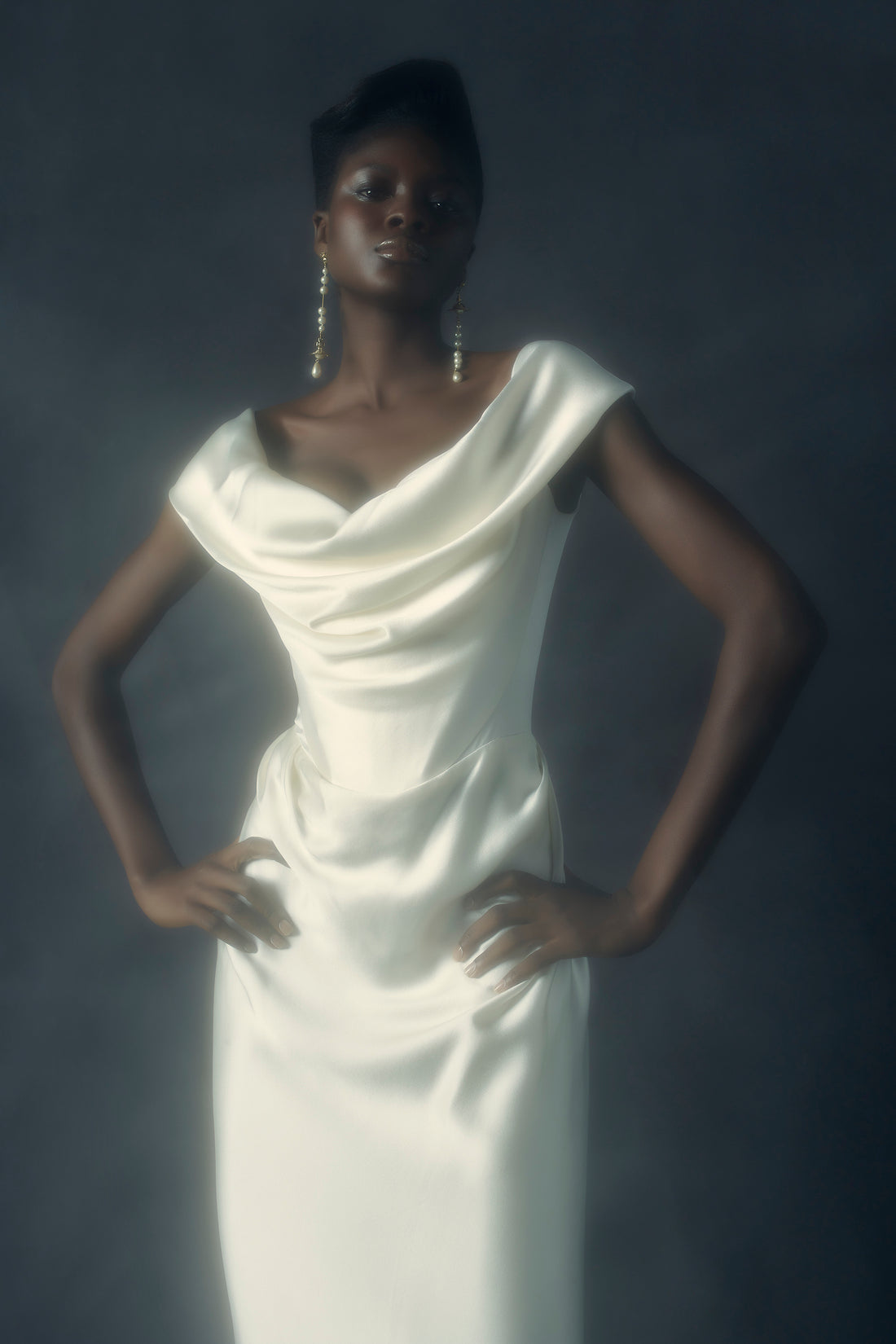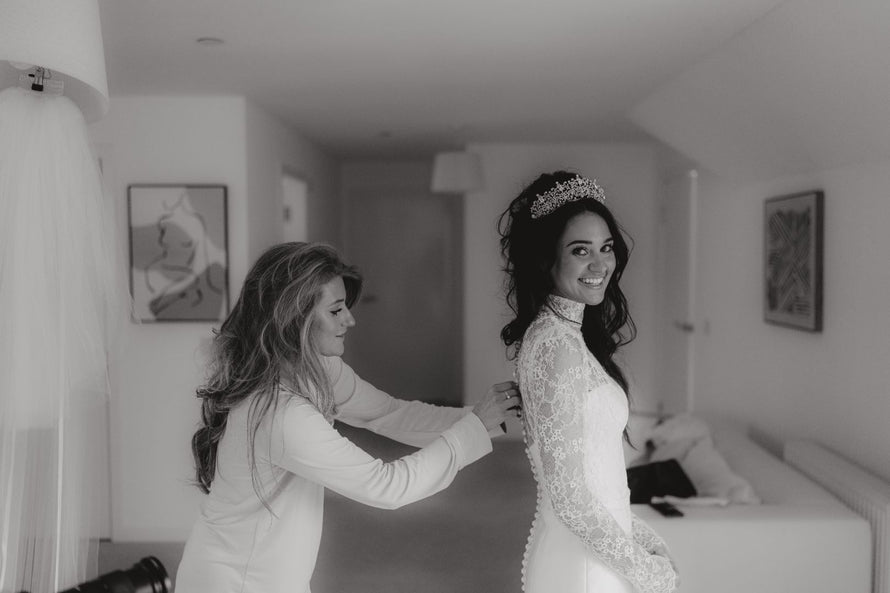'Ask The Expert'
by Rachel Snedden for Your Scottish Wedding
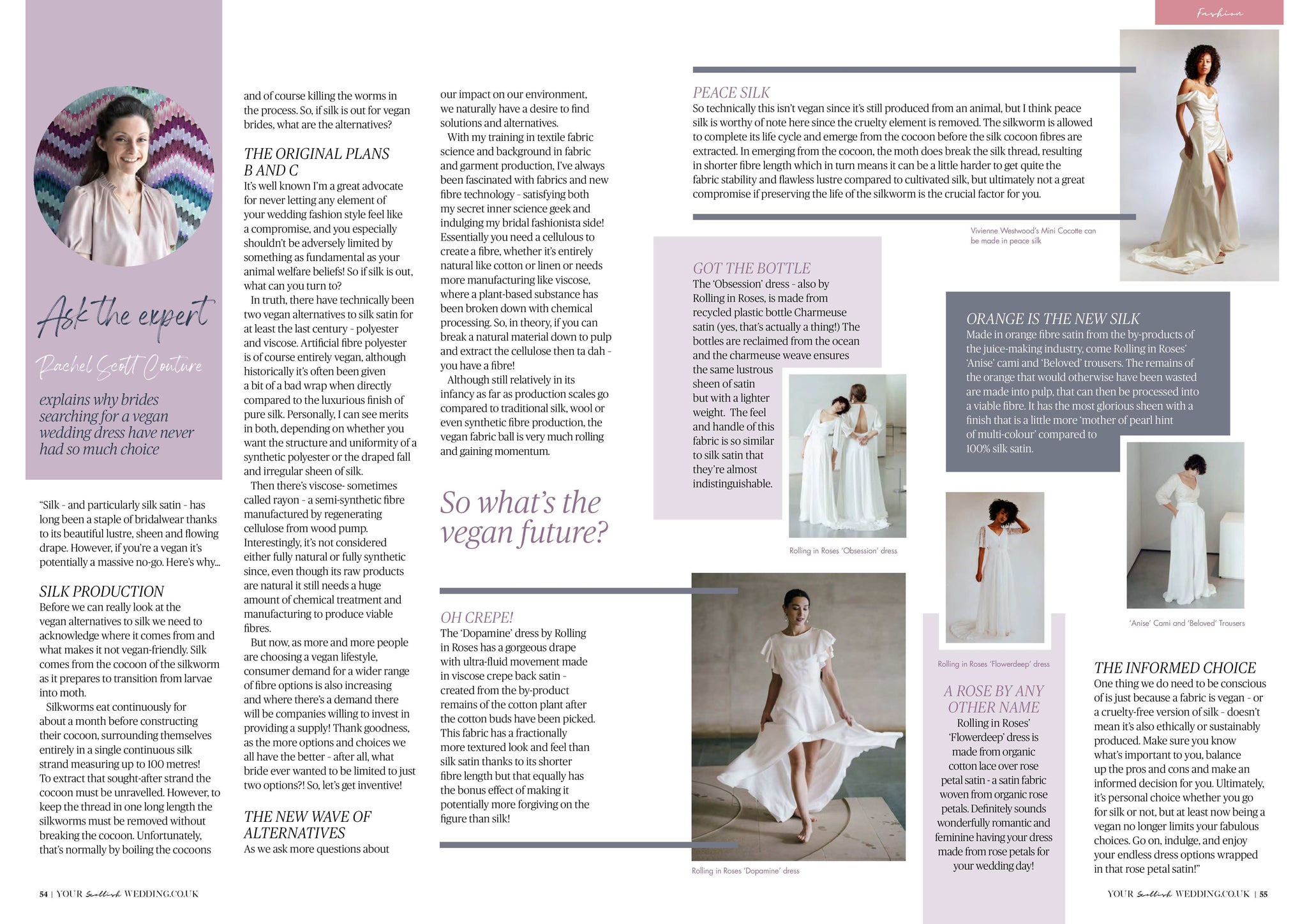
Rachel of Rachel Scott Couture explains why brides searching for a vegan wedding dress have never had so much choice.
“Silk – and particularly silk satin – has long been a staple of bridalwear thanks to its beautiful lustre, sheen and flowing drape. However, if you’re a vegan it’s potentially a massive no-go. Here’s why…
SILK PRODUCTION
Before we can really look at the vegan alternatives to silk we need to acknowledge where it comes from and what makes it not vegan-friendly. Silk comes from the cocoon of the silkworm as it prepares to transition from larvae into moth.
Silkworms eat continuously for about a month before constructing their cocoon, surrounding themselves entirely in a single continuous silk strand measuring up to 100 metres! To extract that sought-after strand the cocoon must be unravelled. However, to keep the thread in one long length the silkworms must be removed without breaking the cocoon. Unfortunately, that’s normally by boiling the cocoons and of course killing the worms in the process. So, if silk is out for vegan brides, what are the alternatives?
THE ORIGINAL PLANS B AND C
It’s well known I’m a great advocate for never letting any element of your wedding fashion style feel like a compromise, and you especially shouldn’t be adversely limited by something as fundamental as your animal welfare beliefs! So if silk is out, what can you turn to?
In truth, there have technically been two vegan alternatives to silk satin for at least the last century – polyester and viscose. Artificial fibre polyester is of course entirely vegan, although historically it’s often been given a bit of a bad wrap when directly compared to the luxurious finish of pure silk. Personally, I can see merits in both, depending on whether you want the structure and uniformity of a synthetic polyester or the draped fall and irregular sheen of silk.
Then there’s viscose- sometimes called rayon – a semi-synthetic fibre manufactured by regenerating cellulose from wood pump. Interestingly, it’s not considered either fully natural or fully synthetic since, even though its raw products are natural it still needs a huge amount of chemical treatment and manufacturing to produce viable fibres.
But now, as more and more people are choosing a vegan lifestyle, consumer demand for a wider range of fibre options is also increasing and where there’s a demand there will be companies willing to invest in providing a supply! Thank goodness, as the more options and choices we all have the better – after all, what bride ever wanted to be limited to just two options?! So, let’s get inventive!
THE NEW WAVE OF ALTERNATIVES
As we ask more questions about our impact on our environment, we naturally have a desire to find solutions and alternatives.
With my training in textile fabric science and background in fabric and garment production, I’ve always been fascinated with fabrics and new fibre technology – satisfying both my secret inner science geek and indulging my bridal fashionista side! Essentially you need a cellulous to create a fibre, whether it’s entirely natural like cotton or linen or needs more manufacturing like viscose, where a plant-based substance has been broken down with chemical processing. So, in theory, if you can break a natural material down to pulp and extract the cellulose then ta dah – you have a fibre!
Although still relatively in its infancy as far as production scales go compared to traditional silk, wool or even synthetic fibre production, the vegan fabric ball is very much rolling and gaining momentum.
SO WHAT'S THE VEGAN FUTURE?
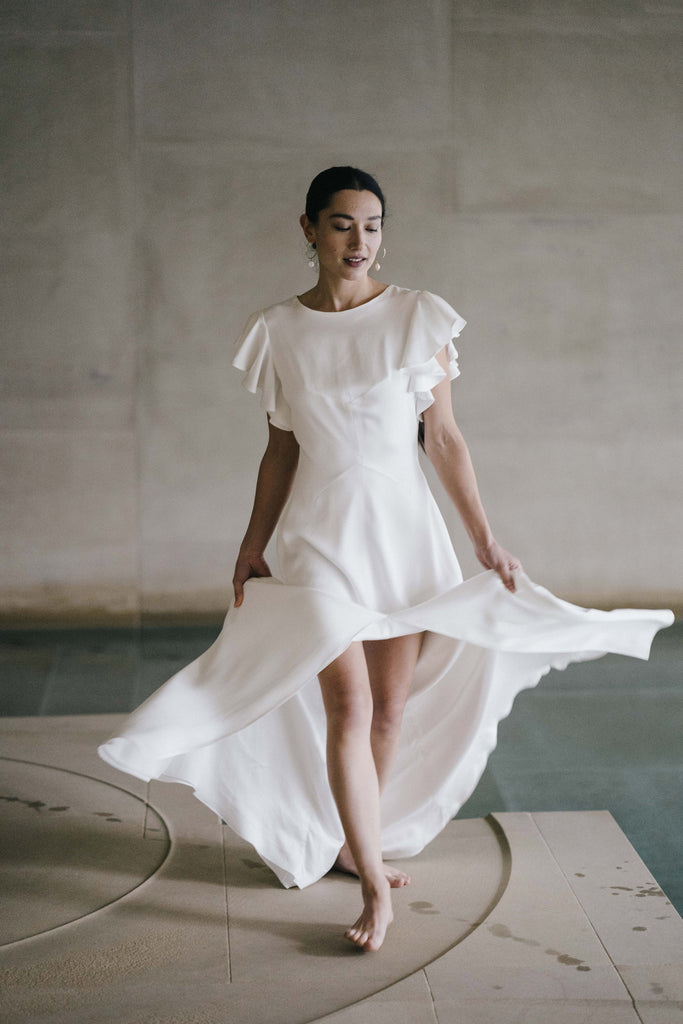
OH CREPE!
Viscose crepe back satin
The ‘Dopamine’ dress by Rolling in Roses has a gorgeous drape with ultra-fluid movement made in viscose crepe back satin – created from the by-product remains of the cotton plant after the cotton buds have been picked. This fabric has a fractionally more textured look and feel than silk satin thanks to its shorter fibre length but that equally has the bonus effect of making it potentially more forgiving on the figure than silk!
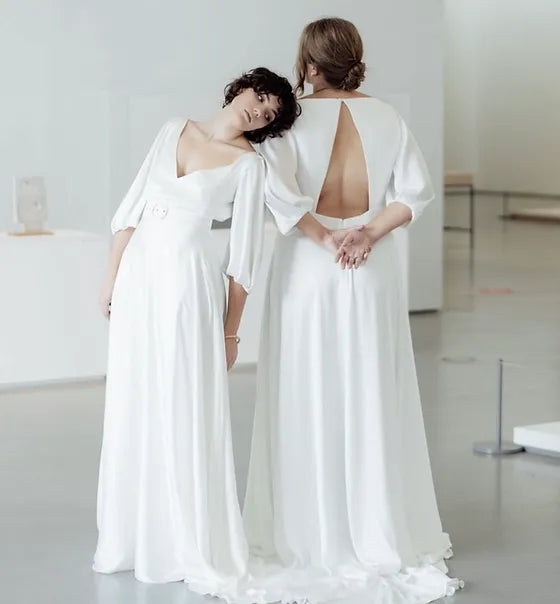
GOT THE BOTTLE
Recycled plastic bottle Charmeuse satin
The ‘Obsession’ dress – also by Rolling in Roses, is made from recycled plastic bottle Charmeuse satin (yes, that’s actually a thing!) The bottles are reclaimed from the ocean and the charmeuse weave ensures the same lustrous sheen of satin but with a lighter weight. The feel and handle of this fabric is so similar to silk satin that they’re almost indistinguishable.
ORANGE IS THE NEW SILK
Orange fibre satin
Made in orange fibre satin from the by-products of the juice-making industry, come Rolling in Roses’
Anise cami and Beloved trousers. The remains of the orange that would otherwise have been wasted
are made into pulp, that can then be processed into a viable fibre. It has the most glorious sheen
with a finish that is a little more ‘mother of pearl hint of multi-colour’ compared to 100% silk satin.
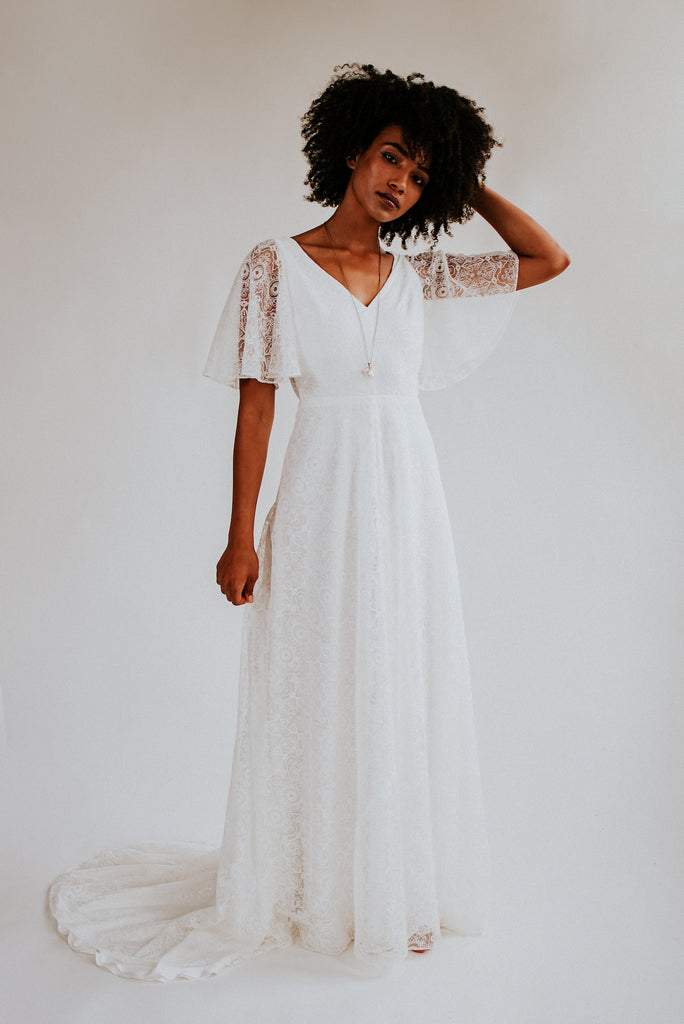
A ROSE BY ANY OTHER NAME
Rose petal satin
Rolling in Roses’ Flowerdeep dress is made from organic cotton lace over rose petal satin - a satin fabric woven from organic rose petals. Definitely sounds wonderfully romantic and feminine having your dress made from rose petals for your wedding day!
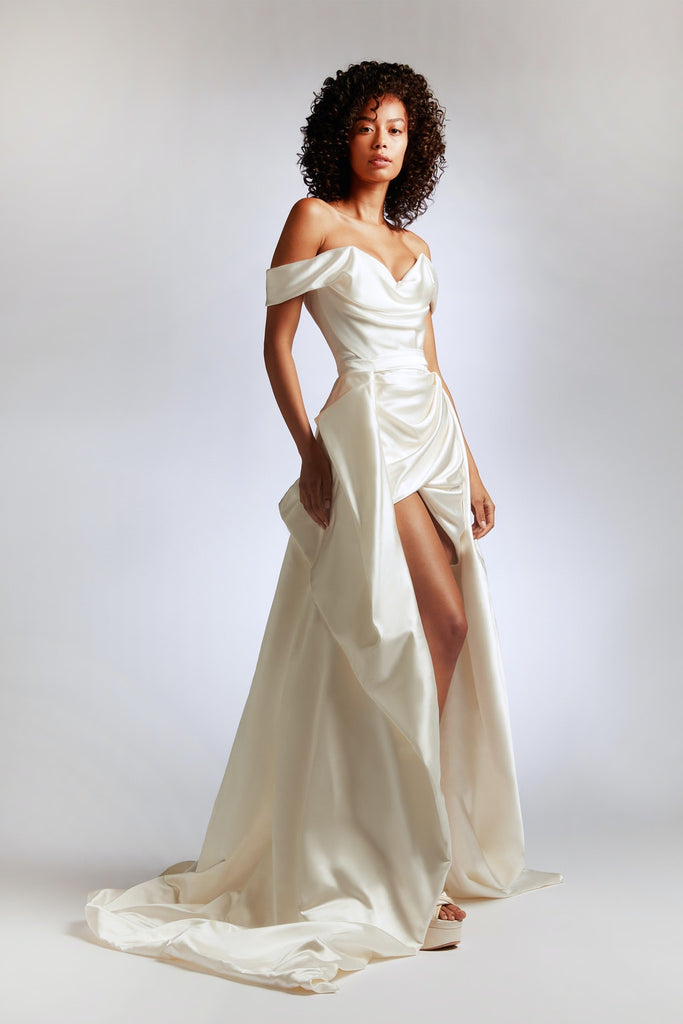
PEACE SILK
Vivienne Westwood’s Mini Cocotte can be made in peace silk
So technically this isn’t vegan since it’s still produced from an animal, but I think peace silk is worthy of note here since the cruelty element is removed. The silkworm is allowed to complete its life cycle and emerge from the cocoon before the silk cocoon fibres are extracted. In emerging from the cocoon, the moth does break the silk thread, resulting in shorter fibre length which in turn means it can be a little harder to get quite the fabric stability and flawless lustre compared to cultivated silk, but ultimately not a great compromise if preserving the life of the silkworm is the crucial factor for you.
THE INFORMED CHOICE
One thing we do need to be conscious of is just because a fabric is vegan – or a cruelty-free version of silk – doesn’t mean it’s also ethically or sustainably produced. Make sure you know what’s important to you, balance up the pros and cons and make an informed decision for you. Ultimately, it’s personal choice whether you go for silk or not, but at least now being a vegan no longer limits your fabulous choices. Go on, indulge, and enjoy your endless dress options wrapped in that rose petal satin!”
